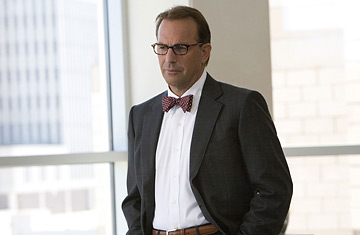
Kevin Costner as Mr. Brooks.
Director: Bruce A. Evans; Writers: Evans and Raynold Gideon
With Kevin Costner, Demi Moore, Dane Cook, William Hurt, Danielle Panabaker
MGM Video
Available Oct. 23; List price $19.99
Costner made his name playing the extraordinary ordinary man: the righteous fellow who nabs the Mafia (in The Untouchables), who isn't crazy when he communes with dead ballplayers (Field of Dreams). But one of his earliest starring roles was as a good-guy bad guy in No Way Out. He revisits the dark side as Earl Brooks: a community pillar and serial killer.
A loving husband and caring father, Earl on occasion chooses strangers to gun down, then meticulously re-stages and cleans up the murder scene to tantalize the police and leave no trace of his identity. He's seen as a decent man enslaved by a sociopathic alter ego he calls Marshall (Hurt in full sardonic, satanic mode). Poor Earl knows he's got a problem and tries to seek help. Another movie that opened in June, You Kill Me, shared the premise of a murderer who goes to AA meetings but turned it into quirky romantic comedy. Mr. Brooks isn't about redemption; it starts in the lower psychological depths and keeps heading south.
Marshall isn't the only disturbed voice Mr. Brooks hears. A voyeur who calls himself Mr. Smith (Cook) got a rush from witnessing one of Earl's double killings and insists on accompanying him on his next job — though when the crucial moment arrives, Smith gets so excited that he wets his pants. Earl's daughter (Panabaker) is implicated in a college homicide, suggesting that she may have inherited Dad's deadly compulsion. The detective on his trail (Moore) is being pursued by an escaped sicko and his girlfriend. As the twisted grins multiply and the body count mounts, you may think that everyone in Portland, Ore., is hot to kill everyone else.
That's just one of the plausibility problems the movie has. Nobody cares if a teen slasher film makes plot sense, but an adult thriller has to observe some kind of character logic, and Mr. Brooks is constantly begging the viewer to take some new twist on faith. The picture relies solely on Costner's longtime connection with the audience: the fondness they have for this old-fashioned star, and the suggestion that, this time out, the actor is wrestling with his role as much as Earl is fighting his most toxic impulses. That explains the discomfort the character feels in his own skin, and makes Costner's turn — and this imperfect movie — worth catching.